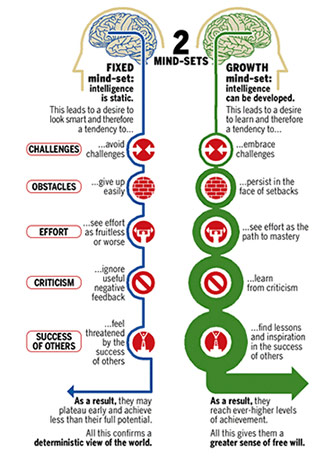
I failed my first accounting midterm yet went on to make the Dean’s list and achieved academic awards, graduating as top graduate from one of Canada’s premiere MBA programs. How did I achieve those results? By believing that I could effect my dismal result through hard work: effort.
My experiences impacted my beliefs
My beliefs impacted my actions
My actions contributed to my results
My early school experiences led me to believe that I was “gifted” and had natural academic talent that didn’t require me to put much effort into my studies. Because I held these beliefs, I didn’t study effectively and failed the exam. I’m sure I wallowed in self pity for a few days, blaming the instructor for writing a bad test and likely second guessed whether I had what it took to complete the program. If I had a fixed mindset, this experience would very likely have ended very differently than it did. I may have dropped out of university altogether, changed programs or cheated to get different results. That’s what fixed mindset people do.
According to Carol Dweck, Mindset, The New Psychology of Success,

Improve your results in business or in life by:
- Fostering a growth mindset – believe that effort can improve results. Use a coach to help you shift your mindset.
- Monitoring results and making decisions – change strategies or tactics if you are not getting the results you desire. Don’t give up.
- Learning – use whatever format and methods work for you, but continually seek knowledge and skills. Study trends, innovations in your industry, improvements to your craft, technology innovations, new leadership theories, new legislation, safety improvements, etc. and apply what you learn to your situation.
- Playing “above the line” – be accountable for your role in the results you achieve and avoid the blame game.
- Focusing – in order to focus on the critical few great goals, you need to say “no” to the many good ideas that come your way – every day.
Photo Credit: http://danerwin.typepad.com/my_weblog/2014/04/dweck.html



